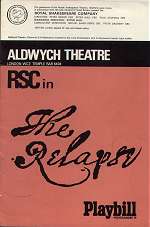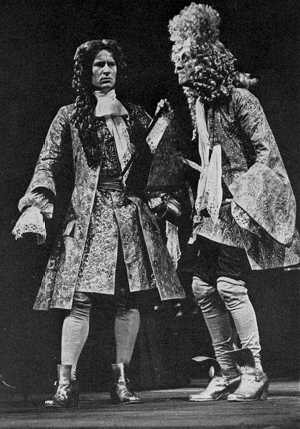
 |
|
The Relapse is the fourth Restoration comedy to be seen in or near London this summer. The score is two Farquhar, two Vanbrugh; nothing, curiously enough, from the master, Congreve. Superficially, there are parallels with present-day London. We, too, have our male peacocks, and we share a preoccupation with money and sex, and an absolute worship of triviality. This production has the great merit of probing beneath the surface and - lo and behold! - there are traits and emotions of far greater seriousness and psychological truth. There is, however, no neglect of the surface; the fun is uproarious, the wit stylish and the whole presentation delightful. In short: something of a triumph. There are two plots, only tenuously connected by a social call. Loveless, happily married to Amanda, has the relapse of the title: an affair with his wife's more worldly cousin, Berinthia. To facilitate things, Berinthia engineers a liaison between Amanda and an ex-lover, Worthy. But when it comes to the point, Amanda doesn't yield, and virtue triumphs. The second plot concerns Foppington, recent beneficiary of an inheritance (used to purchase a peerage), and his younger brother, Fashion. The brother, slighted by the newly-created Lord, revenges himself by impersonating him and marrying his bride, Miss Hoyden, daughter of a rich country gentleman, Sir Tunbelly Clumsey. |
 |
Swarming around these characters is a rogues' gallery of servants and attendants, including a nurse, a chaplain and a pimp.
Vanbrugh regards these figures with a wonderful warmth and understanding. He is less bitchy and snobbish than other writers of the period, and also less sentimental. His dialogue lacks the glitter of the best of them, but he eschews their artificiality. He is at his most revealing in Worthy's aside to the audience. Having just been rebuffed by the desired Amanda, he is momentarily enthralled - even over-whelmed - by this manifestation of honesty. Briefly, he envisages a world without deceit. In a fit of nostalgiede la vertu, he resolves to turn over a new leaf. He develops the theme raphsodically - and, with a clear cold blast of realism, decides it wouldn't last. There speaks Vanbrugh, a disillusioned man.
With this production Trevor Nunn establishes himself in the front rank of young directors. I was critical of his handling of Tango last year, but this time he doesn't put a foot wrong. The emergence of a whole new generation of directors - young men like Derek Goldby, Peter Gill and Robert Kidd - has been a most heartening development. Working for the most part in subsidised theatres, they should be given plenty of opportunity to flex their muscles. Trevor Nunn's approach to The Relapse is entirely justified by the results: he plays each scene for its innate dramatic value without disrupting the rhythm and texture of the whole. His opening scene between Loveless and Amanda, is idyllic, almost Chekhovian, in mood. In the dim evening light, she sits on a garden swing, making desultory conversation. In the nature of events, her husband, whom she loves, will be unfaithful to her - not because he doesn't love her, but because he's........well, a man. This scene is full of the anticipation of regret. Later, in the long and delicious duet between the rwo women, one is reminded of Marivaux. Later still, in the grotesque mock trial scene, the mood is Goyasque. These variegated impressions make the evening a very rich experience: rich in allusion, as well as in emotion.
Visually, the production is gorgeous. There are screen and panels of revolving mirrors - Svoboda showed the way here - and the costumes, too, are predominantly silver, with contrasting pinks. Christopher Morley, a designer new to me, deserves congratulations. Guy Woolfenden's musical arrangements, and the charming wedding masque at the end, make important contributions.
As this is a comedy of attitudes, most of the characters are split personalities: the person they are, and the person they pretend to be (Hoyden and Amanda are the exceptions). Even Foppington, the beau par excellence, wasn't born powdered and pomaded. We see him first at his levée, a rather weary man (the same kind of weariness that Ronald Lewis brought so memorably to Lord Darlington). Donald Sinden, in a brilliant performance, begins the day in the cadences of Malcolm Muggeridge, and is gradually turned into a rouged puppet by his dozen or so attendants. At heart he remains a rather foolish, puzzled man, desperately anxious to do the correct fashionable thing. He is virile, worried and a little sad. His disastrous foray into the country - he's taken for an imposter - is borne with fortitude. 'A pox on these bumpkinly people,' he says, with every good reason, and endures the humiliation of being wheeled around wildly in a wheelbarrow with the stoicism of a traveller abroad, caught up in some incomprehensible native rite. Sir Tunbelly (David Waller) is played like a rustic barbarian escaped from Armstrong's Last Goodnight. He would have been funnier if there had been more emphasis on the fact that he too was trying to buy his way into the beau monde of London. But there were plenty of high jinks involving a drawbridge and a host of 'slaves', armed with blunderbusses. The daughter, Hoyden (Frances de la Tour), a gauche creature of wild unbridled instincts, coped valiantly with marriage and society, like a girl from Benendon let loose in Buck House. It seemed plausible for once that the high-principled Young Fashion (Alan Howard) could fall in love with his uncouth bride. In spite of his doubtful conduct, he personifies Honesty. Their relationship is on the right lines, but could be developed further. One should feel that they'd end up in a country manse, with at least twelve children.
The quartet of lovers were very stylishly played. Earlier productions of The Relapse went full out for camp, and Foppington dominated the play. Berinthia tended to be played as a simpering tart. Janet Suzman acts her with a grace and wit, with a finesse, that made me look at the programme to see if the words 'de la Comédie Française' were appended to her name. This is a tarnished woman, wistfully gay, who likes to lead others - ever so gently - into corruption. Her shout of 'help' - in the tiniest voice imaginable - as she is carried off to bed, is one of the great moments of comedy (as well as reminding me of a French au pair girl). Susan Fleetwood (Amanda) shows that one can be good without being prim, and Charles Thomas and Patrick Stewart partner them effectively as Loveless and Worthy.
The grotesques include a gnarled servant, Lory (Tim Wylton), the Nurse and the Chaplain, presented engagingly as two performing elephants by Lila Kaye and Roy Kinnear, and the odious Coupler, a sinister old lecher ('Stand off, old Sodom'), who is kept firmly this side of realism by Donald Burton. He whisks off a scarlet tablecloth, puts it around his shoulders and - hey presto! - he's a judge. Here is the essence of Restoration comedy, or comedy of masks: pretence, make-believe, you are who you appear to be, to fit into society, to conform to fashion. Only the playwright knows the ugly truth and sometimes, if he's honest, he shares his secret with the audience. Vanbrugh was such a man, and this vivid and inventive production proves that The Relapse is as much a memorial to him as Blenheim Palace.
Frank Marcus.
Plays and Players, October 1967.